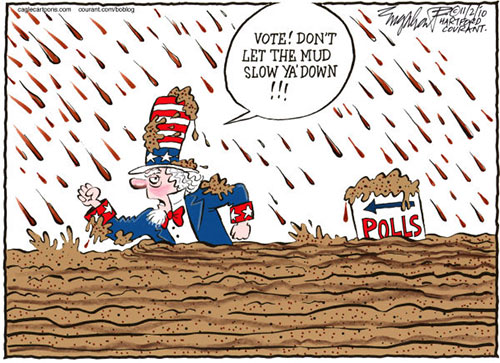
50th Anniversary of the TV Ad that Changed Politics
September 11, 2014
Maybe our politics would be cleaner, but who knows. If the "Daisy ad" hadn't smeared Barry Goldwater as a warmongering madman, the odds are that some other attack would've opened the floodgates. Back in the Mad Men era, savvy politicians already knew that Madison Avenue was brilliantly adept at getting inside our heads, at exploiting our hopes and fears, and it just so happened that Lyndon Johnson got there first. On the night of Sept. 7, 1964, NBC aired an old film, David and Bathsheba. There were frequent breaks for commercials, one of which was so unique that, metaphorically speaking, it blew people away.
Campaign ads Sixty seconds in length, it featured three-year-old Monique Corzilius of Pine Beach, New Jersey. Monique was an advertising veteran, having popped up in magazine ads for 1960s staples like Hostess and Velveeta. But this time, the cutting-edge Doyle Dane Bernbach ad firm, working for the LBJ White House, enlisted her (with her parents' OK, for a fee of $100) to put the zap on LBJ's 1964 opponent. Goldwater, the hawkish conservative who had snagged the GOP presidential nomination, was already known for saying crazy stuff off the cuff. He had joked publicly about lobbing a nuke into "the men's room" at the Kremlin and suggested that American military leaders should have the option of using "tactical" nukes in Vietnam. Enter Monique, forever to be known as Daisy girl. She was coached to pluck some daisy petals, and to count to 10 as she did so. Then came the stentorian voiceover, counting down to a nuclear launch. As LBJ's voice (quoting W. H. Auden) intoned, "These are the stakes - to make a world in which all of God's children can live, or to go into the dark. We must either love each other. Or we must die." Then came the deep-timbered voice of sports announcer Chris Schenkel: "Vote for President Johnson on Nov. 3. The stakes are too high for you to stay home." The ad never mentioned Goldwater. It didn't have to. It merely tapped into existing fears. As one of the key ad men, Tony Schwartz, told me many years later, "We used imagery that connected with what the public was already sensing...We're packaging the voter. We're tying him up and delivering him to the ballot box." And the paid ad only ran once. LBJ's team didn't have to pay another dime. The Goldwater people were furious, and their vocal complaints drove the news cycle for days on end; to cover the story, the networks were compelled to air the ad over and over - "free media," in today's parlance. Many commentators felt that the ad had "crossed the line," and many political strategists were shocked, because they'd come to believe that going negative would inevitably hurt the candidate who did it. How quaint this all sounds today. Daisy plowed the ground for 1968, when Richard Nixon ran ads that sought to link Democratic opponent Hubert Humphrey to inner-city rioting; and for 1988, when George Bush's allies ran ads suggesting that Michael Dukakis was soft on black rapists. Today we barely blink when negative ads roll by, even when they're grounded in lies. As for Monique, now 53 and living in Arizona, she's a bit weirded out by her place in history, and how she (unwittingly) lowered the bar for campaign discourse. She tells a reporter, "It's frustrating, and they say this ad helped contribute to that a lot. Oh, my gosh, I hate that. Not that I did it personally, but the ad that I was in contributed to it. So that's kind of disappointing." And as for Barry Goldwater, I talked to him about the Daisy ad in 1988, nearly a quarter century after it aired. He was still ticked off - but at one point he said, "I did think the ad was pretty damn clever." Indeed it was, in a bludgeoning sort of way. Attack ads are often quite artistically clever, and they often work. Such were the lessons of 1964, which is why, alas, we've been plagued by Daisy's ilk ever since.
Copyright 2014 Dick Polman Dick Polman is the national political columnist at NewsWorks/WHYY in Philadelphia (newsworks.org/polman) and a "Writer in Residence" at the University of Philadelphia. Email him at dickpolman7@gmail.com. This column has been edited by the author. Representations of fact and opinions are solely those of the author. Distributed to subscribers
for publication by E-mail your news & pHotos to editor@sitnews.us Publish A Letter
|
||
